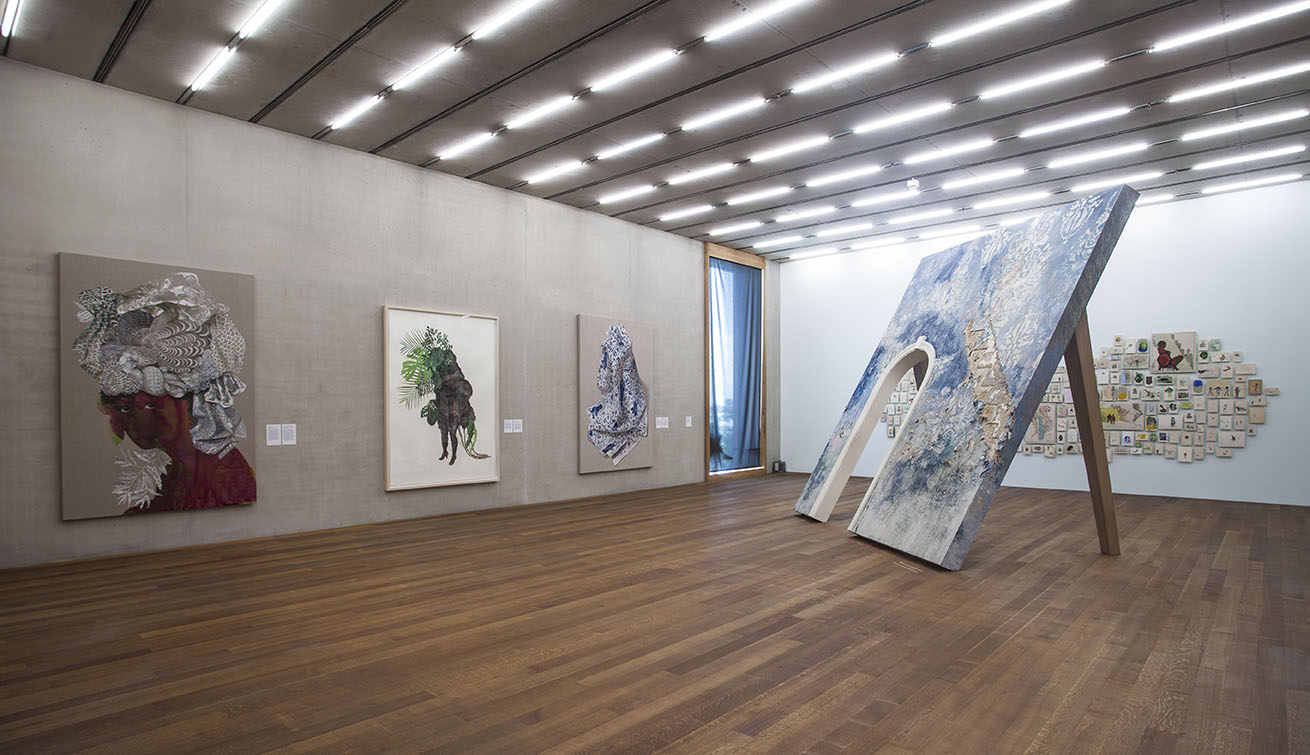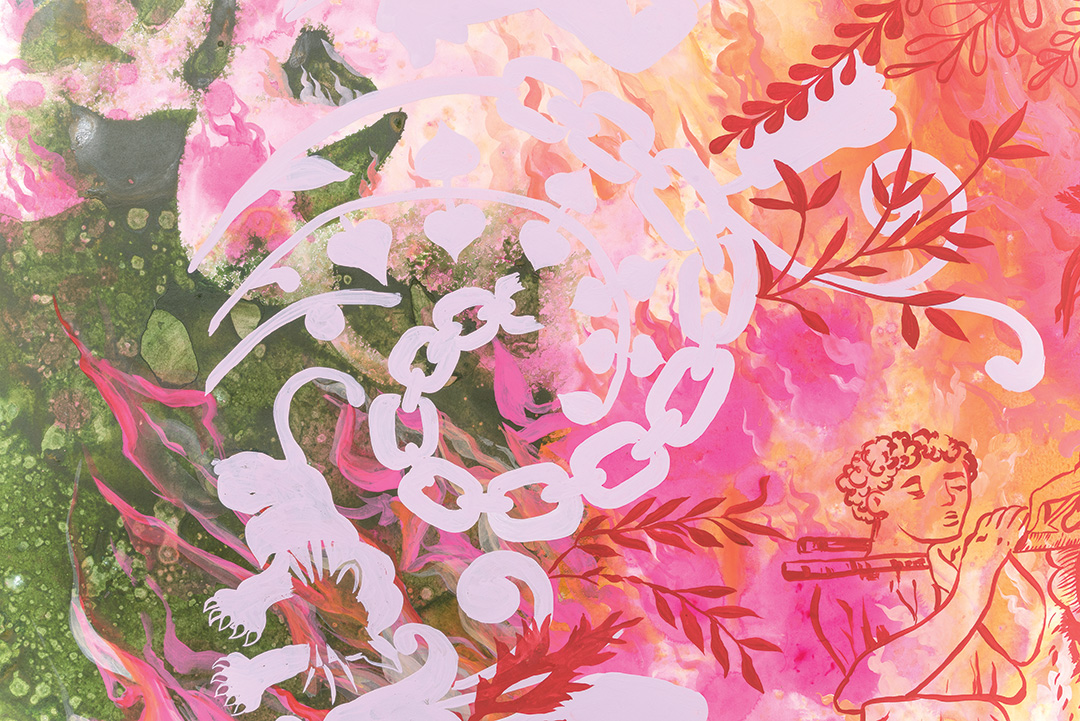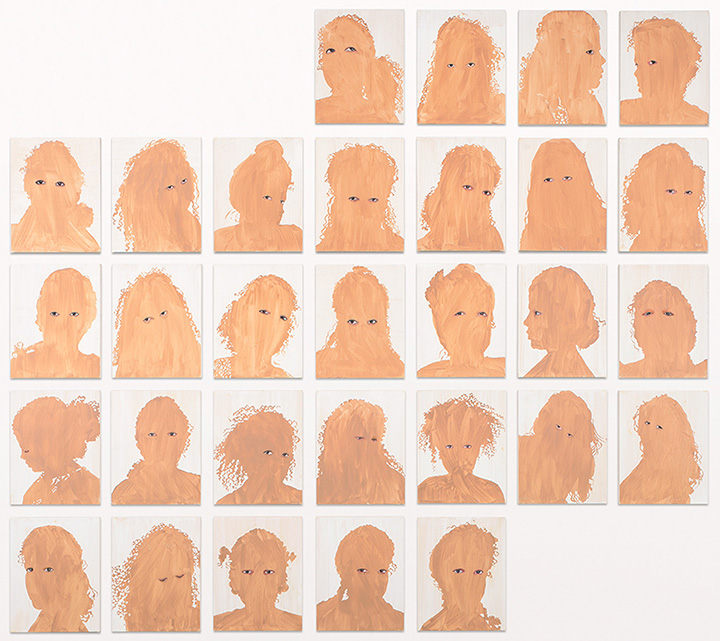
At Pérez Art Museum Miami, a discussion on race and identity, in images and words
Above: Firelei Báez work at Pérez Art Museum Miami. Photo via PAMM.
Identity and racial politics in the United States and the Caribbean are central themes in the work of Brooklyn-based, Dominican-born artist Firelei Báez, whose smart, powerful exhibit “Bloodlines” is at the Pérez Art Museum Miami through March. Báez´s work, and her concerns, served as framework for a conversation featuring authors Roxane Gay and Jeff Chang, part of the Scholl Lecture Series at the museum, Saturday afternoon.
Báez’s show, curated by PAMM Assistant Curator María Elena Ortiz, includes drawings, watercolors, textiles and installations, smartly probing her subjects from unexpected angles. It includes works such as the installation “Can I Pass? Introducing the Brown Paper Bag to the Fan Test for the Month of June” (2011), a calendar of hair styles of the artist, alluding to both, the brown paper bag test in the South and the Dominican Republic’s fan test, which determined if a woman was black by how her hair flowed when fanned.
There is a wall occupied by an installation, suggesting the shape of an island, made of old book pages (and not just from any books, at least one included a text about Social Darwinism, a theory which has long served to justify inequality) altered by drawings and paintings, connecting the American South and the Caribbean. The center of the room is occupied by a tilting wall, a faux archeological artifact, part of a colonial house owned by “an affluent 18th century person of color living in the Caribbean or the United States” – a reframing of a 1974 work by artist Gordon Matta Clark that showed a cut fragment of an actual New York colonial house.
On Saturday, both Gay, author of “Ayiti” (2011), “An Untamed State” (2014) and “Bad Feminist” (2014), and Chang, author of “Can’t Stop, Won’t Stop” (2005) and “Who We Be” (2014), read personal essays before engaging in conversation followed by a question-and-answer session and book signing.
Fittingly mirroring the work of Báez, who was in attendance, the discussion was informed, thoughtful, broad and spiced with moments of humor.

Firelei Báez, ‘Those who would douse it’ (detail), 2015. Photo via PAMM.
Chang, who took the role of host, set the framework of the talk by noting that “we are at a point now where polls shows Americans believe that race relations are at a worse point than at any time since 1992. The last time the polls showed this much concern before 1992 was 1965.” He also noted that while simultaneous exhibits by Báez and New York-based, Jamaican artist Nari Ward spoke of a “cultural desegregation, there’s also a physical resegregation.”
Born in Nebraska of Haitian descent, Gay read an excerpt from “In the Manner of Water or Light,” from her short story collection “Ayiti” and also included in the “Bloodlines” catalog. The story, both personal and political, alludes to the massacre of Haitians by Dominican forces in 1937, and addressed “memory and history. Sometimes we have to trust our memory more than history … which is controlled by who’s writing [it].”
But the discussion also included explorations of a variety of subjects such as the importance and power of symbols (case in point, the Confederate flag), college activism, the impact of Black Live Matters (“It has reduced my cynicism,” Gay said) and the notion of “respectability.”
“RZA of Wu Tang Clan, of all people, said black people would face less harassment if they dressed better,” she said. “None of us are immune from this idea of respectability, but we have to continue to push against it. If I work hard enough, if I achieve enough, I’ll be OK, I won’t get shot for being black—which is nonsense.”
Gay also addressed a question about feeling a responsibility, as a writer of color, to properly represent voices that are otherwise not represented. “Not really. It’s fiction,” she offered. “I do feel a certain sense of responsibility but at the end of the day, it’s fiction. Dennis Lehane isn’t sitting around worrying about what his novels are doing for the reputation of Boston. I try not to put too much unnecessary responsibility on myself.”
At one point, Gay exchanged roles with Chang, posing a provocative, and open-ended, question:
“We hear a lot of talk about how statistically by the year 2060, give or take, we are going to have a majority of non-white people,” said Gay. “But do you know what year exactly are we going to have freedom from systemic racism? History shows that you don’t need a white majority for white ideals to rule the world.”
“I think that’s the history of the Caribbean,” noted Chang. “And I think that’s the urgency right now: that we have this opening, this opportunity to get it right.”
Fernando González is a Miami-based arts and culture writer. He can be reached via email at [email protected].

‘Can I Pass? Introducing the brown paper bag to the fan test for the month of December.’
Recent Content
-
Artsarticle ·
-
Artsarticle ·
-
Artsarticle ·
